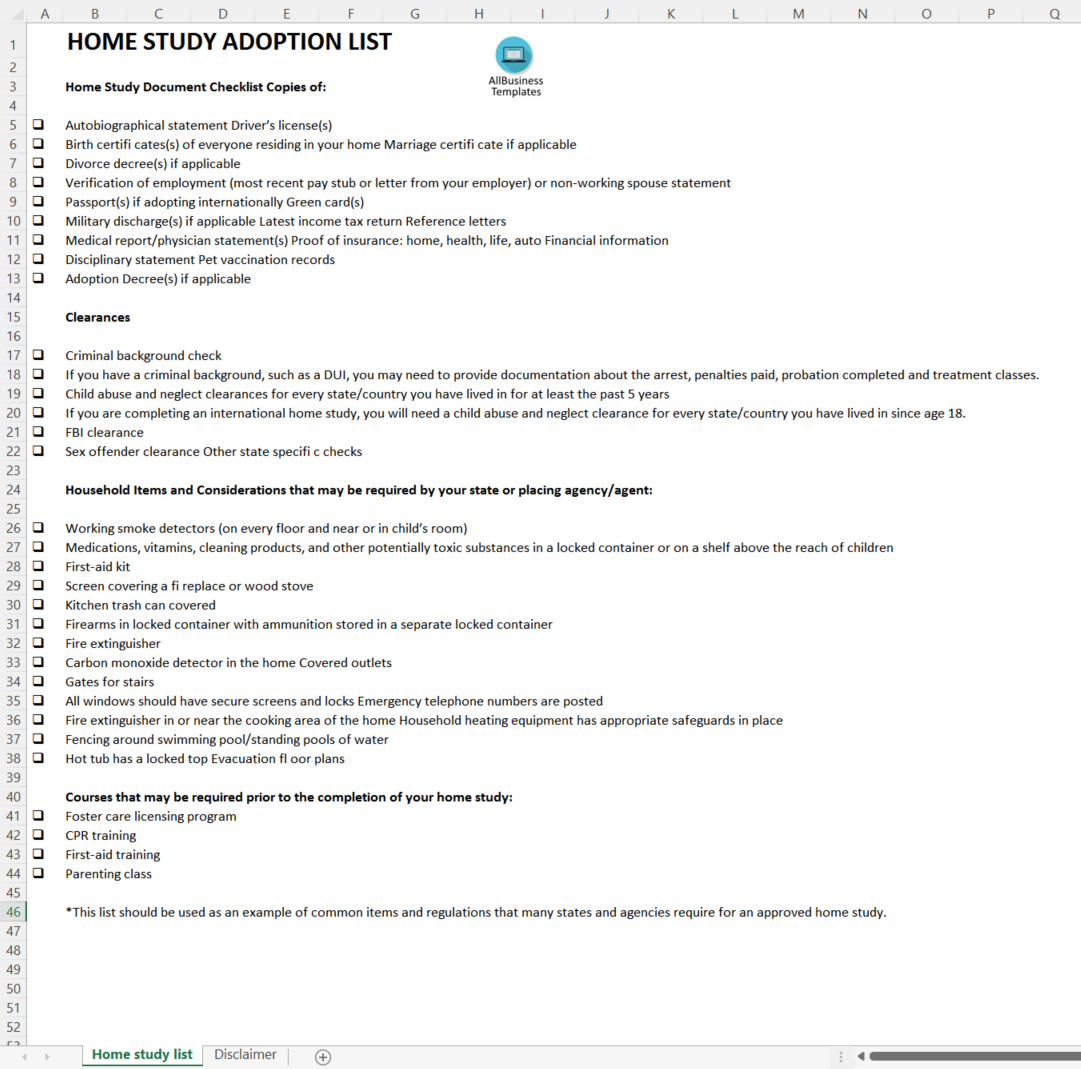Adoption Home Study Checklist For Florida
Table of Content
Florida law imposes a waiting period for the birth mother, but not the birth father, to sign a consent when a newborn is being adopted. She cannot sign until 48 hours after the child’s birth or when she is notified in writing in hospital release paperwork or on her patient chart that she is authorized for release from the hospital. While a minor may not be able to buy a car or sign a contract in Florida, she can consent to the adoption of her child.

The court shall accept a person’s criminal history record information when the information was obtained no more than 1 year before the date the court ordered the history to be obtained. The social study may be made by a private entity, a person appointed by the court, a domestic relations office, or a State agency, including the Department of Family and Protective Services if the department is a party to the suit. When the adoptive home study is completed, the applicants shall be informed in writing as to the disposition of their application. For a child in the custody of the department, the petitioner shall notify the department when the adoption petition has been filed with the court.
Marital Status (Prospective Adoptive Parents)
When you are ready to get started, you will find a checklist on our Forms page. It is our desire at Adopt-Florida Home Studies to make your Home Study smooth and seamless so to take the worry out of this part of your adoption. We are here to guide you through the process and are always available for questions. The more the Home Study Counselor knows about you, the easier it is to give a complete and accurate picture of you in the Home Study. No person may be denied the benefits of this subchapter because of a religious belief in the use of spiritual means through prayer for healing.
Specific steps as detailed in the Florida adoption law must be followed for the consent to be revoked. Once signed and any period for revoking has passed, the consent may only be set aside if the court finds by a higher than normal evidentiary standard that the consent was obtained through fraud or duress. Your American Adoptions home study professional will be able to walk you through the full adoption home study checklist.
What is Adoption Home Study in Florida?
Any out-of-home placement of a child outside the State is subject to the provisions of the Interstate Compact on the Placement of Children. The child shall not be sent to the receiving State until the appropriate authority in the receiving State notifies the sending State, in writing, that the proposed placement does not appear to be contrary to the interests of the child. Placement of children outside the District of Columbia is subject to the provisions of the Interstate Compact on the Placement of Children. The home and the exterior around the home are free from objects, materials, and conditions that constitute a danger to the children served.
Each member of the household shall be interviewed during the period of supervision. The single assessment completed on a foster family for foster care will be accepted for adoption. The worker will check the adoption box on the single application form and, if appropriate, write a brief update. The agency caseworker shall ensure that at least two postplacement visits in person are made before the final decree of adoption is issued, or the stipulated time of the fulfillment of the interlocutory decree.
Different Types of Home Studies
If the court does not order an evaluation, the preference of the minor who is younger than age 14 shall be taken into consideration, if the minor is mature enough to express a preference. The child is placed with a person who was selected by a parent or former parent of the child. If the adoptive home has a swimming pool, wading pool, hot tub, or other bodies of water on the premises, plans must be in place to ensure the safety of the child. No accounting by the petitioner of all disbursements is required unless the accounting is ordered by the court. No investigation or report is required unless otherwise directed by the court.

Refusal to consent to a criminal history check by any individual required to be checked is grounds for the issuance of an unfavorable preplacement assessment. When the adoptive child is younger than age 18, no order of adoption shall be made until 3 months after the petition to adopt has been filed. A person seeking to commence a private-placement adoption shall be certified as a qualified adoptive parent by a court of competent jurisdiction prior to the placement of a child in his or her home. No applicant shall be rejected based on low income or because of receipt of income maintenance payments. The adoption study process shall evaluate an applicant’s ability to budget his or her resources in such a way that a child can be reasonably assured of minimum standards of nutrition, health, shelter, clothing, and other essentials.
Study
The home study must be completed prior to adoptive placement of a child in the home. If it is necessary to decertify a home, the reason shall be stated in a personal interview with the family. The provider shall confirm, in a written notice to the parent, the decision to decertify a home.

The investigation required shall include a fingerprint-based criminal background check with a review of fingerprints by the Illinois State Police and the FBI. When the prospective adoptive parent is married to the birth parent or is the grandparent of the adoptive child, the social investigation shall be completed with regard to the prospective adoptive parent only upon order of the court. The prospective adoptive parents or any adult residing in the prospective adoptive home shall be included in the study. At least one visit shall be in the home, and the applicant and all other family members shall be see and interviewed. Prospective adoptive parents shall be interviewed together as well as separately.
The term Home Study is two fold; one, the Home Study is the report created by your Home Study Professional that is a written representation of your qualifications to adopt a child. This report is how most people involved in your adoption process will form their opinion about you the prospective adoptive family, the home you can provide and what kind of parents you will be. The Department of Family Services shall take applications for adoption services for prospective adoptive families only when ordered to do so by a court of competent jurisdiction or through an Interstate Compact request. All other individuals and families requesting adoptive home study services are to be referred to child-placing agencies. Except for placements with a relative or a stepparent, a person must have a favorable written preplacement evaluation before receiving a child for adoption.
Following the adoptive placement, a period of support and supervision by the department lasting at least 6 months must be completed prior to the finalization of the adoption. In situations where a foster family has a significant relationship with a child and the child has been placed in their home for at least the past 6 months, the supervisory period may be reduced to a minimum of 3 months. The family services worker will make scheduled visits to the home at least monthly during this period to assist the child and the family in their adjustment to each other and will update the child’s permanent record by means of monthly progress reports.
Home studies for adoption in Florida must be thorough, and as a result, they can take some time. The average home study usually takes between three and six months to complete. After successfully completing the home study process, a family is considered eligible to adopt in most cases. Simply put, the adoption home study is a process through which your home and family are evaluated to determine your readiness for adoption. The home study provides an overview of a family’s life, which is helpful throughout the adoption process.

This shall include, but not be limited to, abandoned children, children who are in the process of being freed for adoption, and any child designated as a legal risk placement. A foster/adopt home shall care for the number of children according to the capacity and terms of the foster home license. At any given time there shall be no more than six children residing in the home younger than age 18. The foster/adopt family shall have completed application requirements for adoption to be eligible to apply for license as a foster/adopt family.
An assigned social worker will help guide prospective adoptive parents in Florida with the adoption home study process. Birth parents who place their child for adoption can feel confident that a safe adoption plan is the goal as all prospective adoptive parents are screened. The agency shall continue to provide support services for a minimum of 6 months or longer until permanent placement of the child is achieved. If the child is in the adoptive home as a foster care placement, the period of support services can include the time spent in the adoptive home in foster care.
Comments
Post a Comment